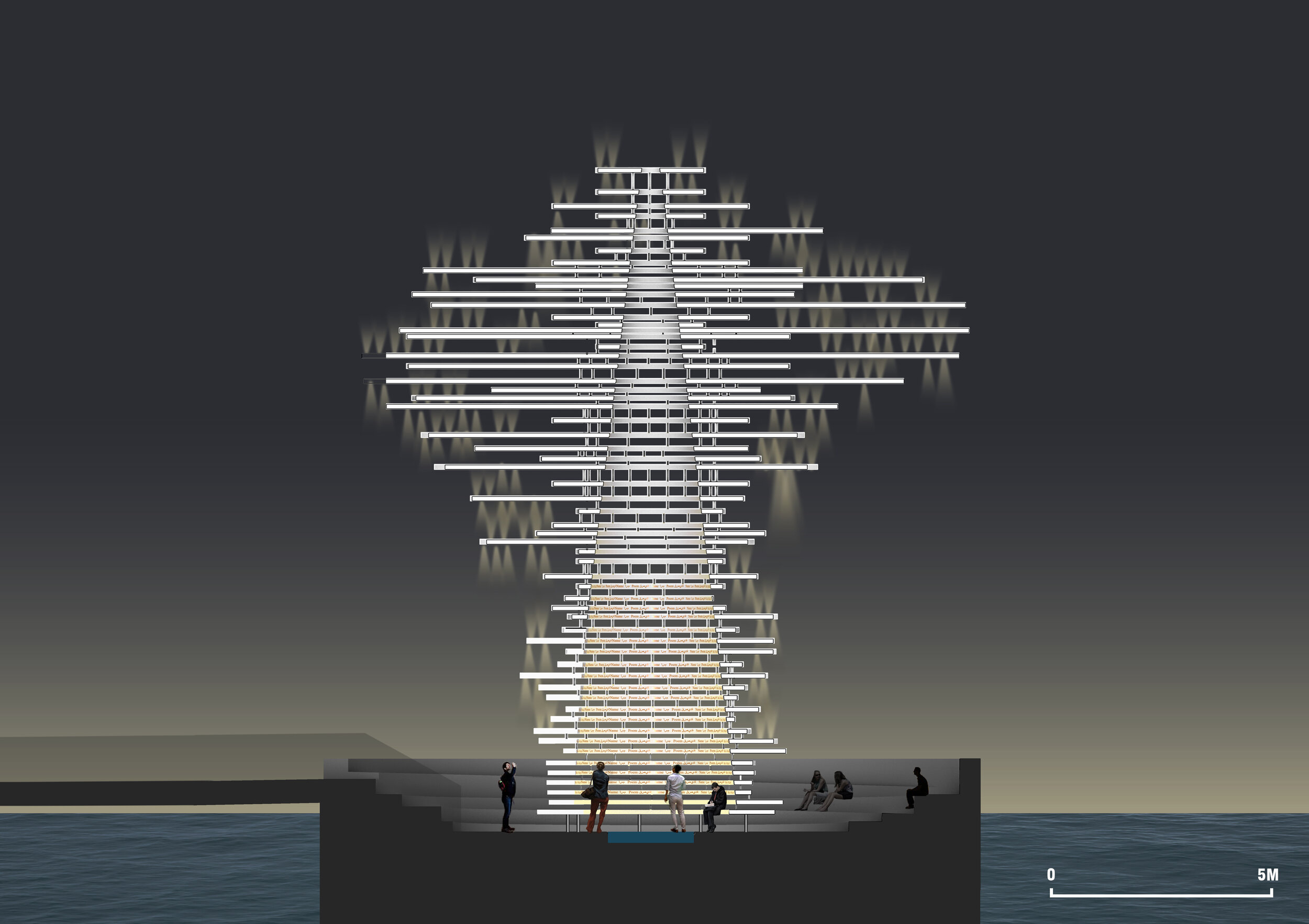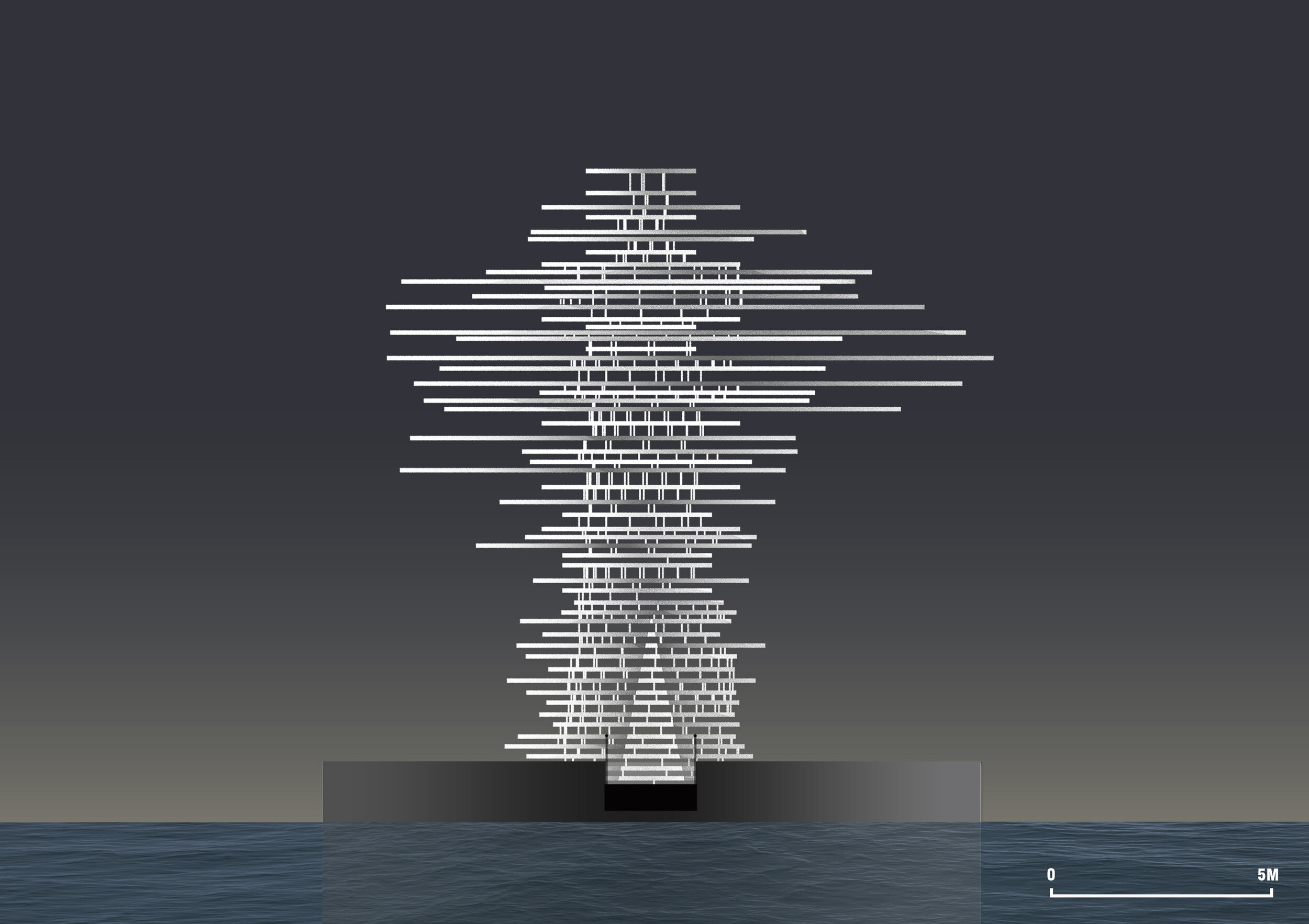Capturing the void in the sea © Studio Lux
Tree of Hope
Souls of Beirut Memorial International Competition
Called by Plus Future
Location: Beirut Lebanon
Time: December 2020
Stage: Competition shortlisted
Team:
Architect: Studio Lux
Lead designer: Hongdi Li
Structural Engineer: Evolve Consulting Engineers https://www.evolveuk.biz/
Lighting consultant: Speirs + Major
CG images: Studio Lux
Media:
Plus Future announcement
Speir + Major social media post
Evolve social media post
Studio Lux social media post
Fascination
What always fascinates us is that Beirut is the meeting-point of the east and the west, the north and the south, is a city of conflicts, disasters yet pluralism.
Project Background
The blast on the 4th of August 2020 took away in excess of 200 souls and injured over 600 people and left many homeless and severely damaged the fabric of the city. More than this it dented the hopes of more than 7 million people.
Contextual Approach
We create the memorial as a symbol of hope in the void of absent lives, with the idea that it is a catalyst for the transformation of the area, our speculation about the context with the memorial becoming a destination of remembrance, memorising history and celebrating the culture.
Form, Space and Meaning
Locating the memorial at the origin of the explosion, based on the poem by Kahil Gibran, The Tree of Hope captures the city’s unique multi-faceted spirit, embodies 'Let today embrace the past with remembrance', strength and new hope can grow out of tragedy and adversity.
The origin of the explosion is captured by creating a stepped depression or a 'void in the sea' to represent the absence the tragedy has created in people’s lives. In-turn the idea of hope for the future is expressed through the abstracted form of a cedar tree, the national symbol of Lebanon and a symbol of eternal steadiness, happiness and prosperity.
From a distance the 15m tall object is a dense but solitary form floating on the water but when experienced up close and from within the form is made up of a perforate and amorphous aggregation of horizontal rings that define the form but also enclose an internal contemplative space.
The inner space is a perfectly formed conical void carved out of the rings creating a light-filled space of peace, tranquillity, for contemplation and remembrance. The internal face of each ring is inscribed with the names of those who lost their lives and the poems of great Lebanese thinkers and poets.
The 60m causeway that leads people from the shore to the memorial takes people to an inner space where the conical shape averts their gaze to the opening on top and sky above. Rain and sunlight penetrate the space to be met by a reflective pond at the base of the space creating and ambience that is specific to time and place.
Materiality
Our aspiration is that the memorial will be crafted and cast from salvaged and recycled materials from the damaged maritime infrastructure and buildings caused by the explosion itself. In a way this method of construction captures the very fabric of the tragedy in time.
Light
Each growth ring is perforated with an array of holes that are more frequent towards the periphery. During the day this allows a shifting dappled light to flood the interior space and bounce light off the water at its base. At night each ring admits light through the perforations and the form itself becomes defined by light that almost dissolves into the evening light and merges with the reflections off the water.post
Inside, space of tranquility for contemplation. The light and weather varies from time to time, from day to day © Studio Lux
Positioned in the centre of the explosion of the Port of Beirut © Studio Lux
Positioned in the centre of the explosion of the Port of Beirut © Studio Lux
Top of The Tree of Hope © Studio Lux
Section - The causeway leads people to a series of experiences. © Studio Lux
Elevation of the entrance from the causeway © Studio Lux
Diagram of the outside and inside © Studio Lux
Water study by Hongdi Li © Studio Lux
Sketch by Hongdi Li © Studio Lux










